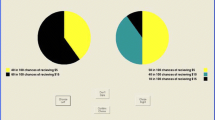Abstract
Elicitation methods in decision-making under risk allow us to infer the utilities of outcomes as well as the probability weights from the observed preferences of an individual. An optimally efficient elicitation method is proposed, which takes the inevitable distortion of preferences by random errors into account and minimizes the effect of such errors on the inferred utility and probability weighting functions. Under mild assumptions, the optimally efficient method for eliciting utilities and probability weights is the following three-stage procedure. First, a probability is elicited whose subjective weight is one half. Second, the utility function is elicited through the midpoint chaining certainty equivalent method using the probability elicited at the first stage. Finally, the probability weighting function is elicited through the probability equivalent method.
Similar content being viewed by others
References
M. Abdellaoui (2000) ArticleTitleParameter-free elicitation of utility and probabilitity weighting functions Management Science 46 1497–1512 Occurrence Handle10.1287/mnsc.46.11.1497.12080
Abdellaoui, M., Bleichrodt, H. and Paraschiv, C. (2004). Measuring loss aversion under prospect theory: parameter-free approach, GRID, ESTP & ENSAM Working Paper.
H. Bleichrodt J.L. Pinto (2000) ArticleTitleA parameter-free elicitation of the probability weighting function in medical decision analysis Management Science 46 1485–1496 Occurrence Handle10.1287/mnsc.46.11.1485.12086
C. Camerer (1989) ArticleTitleAn experimental test of several generalized utility theories Journal of Risk and Uncertainty 2 61–104 Occurrence Handle10.1007/BF00055711
N. Etchart-Vincent (2004) ArticleTitleIs probability weighting sensitive to the magnitude of consequences? An experimental investigation on losses Journal of Risk and Uncertainty 28 217–235 Occurrence Handle10.1023/B:RISK.0000026096.48985.a3
P. Farquhar (1984) ArticleTitleUtility assessment methods Management Science 30 1283–1300
H. Fennema M. assen Particlevan (1998) ArticleTitleMeasuring the utility of losses by means of the trade-off method Journal of Risk and Uncertainty 17 277–296 Occurrence Handle10.1023/A:1007739018615
R. Gonzalez G. Wu (1999) ArticleTitleOn the shape of the probability weighting function Cognitive Psychology 38 129–166 Occurrence Handle10.1006/cogp.1998.0710
P. Ghirardato F. Maccheroni M. Marinacci M. Siniscalchi (2003) ArticleTitleA subjective spin on roulette wheels Econometrica 71 1897–1908 Occurrence Handle10.1111/1468-0262.00472
D. Harless C. Camerer (1994) ArticleTitleThe predictive utility of generalized expected utility theories Econometrica 62 1251–1289
J. Hershey P. Schoemaker (1985) ArticleTitleProbability versus certainty equivalence methods in utility measurement: Are they equivalent? Management Science 31 1213–1231
J.D. Hey C. Orme (1994) ArticleTitleInvestigating generalisations of expected utility theory using experimental data Econometrica 62 1291–1326
U. Karmarkar (1978) ArticleTitleSubjectively weighted utility: A descriptive extension of the expected utility model Organizational Behavior and Human Performance 21 61–72 Occurrence Handle10.1016/0030-5073(78)90039-9
R. Keeney H. Raiffa (1976) Decisions with Multiple Objectives: Preferences and Value Tradeoffs Wiley New York
R. Krzysztofowicz L. Duckstein (1980) ArticleTitleStrength of preference and risk attitude in utility measurement Organizational Behavior and Human Performance 31 88–113 Occurrence Handle10.1016/0030-5073(83)90114-9
M. McCord R. Neufville Particlede (1986) ArticleTitle‘Lottery Equivalents’: Reduction of the certainty effect problem in utility assessment Management Science 32 56–60
J. Quiggin (1982) ArticleTitleA theory of anticipated utility Journal of Economic Behavior and Organization 3 323–343 Occurrence Handle10.1016/0167-2681(82)90008-7
J. Ronen (1973) ArticleTitleEffects of some probability displays on choices Organizational Behavior and Human Performance 9 1–15 Occurrence Handle10.1016/0030-5073(73)90032-9
V.L. Smith J. Walker (1993) ArticleTitleMonetary rewards and decision cost in experimental economics Economic Inquiry 31 245–261 Occurrence Handle10.1111/j.1465-7295.1993.tb00881.x
Ch. Starmer R. Sugden (1989) ArticleTitleProbability and juxtaposition effects: An experimental investigation of the common ratio effect Journal of Risk and Uncertainty 2 159–178 Occurrence Handle10.1007/BF00056135
A. Tversky D. Kahneman (1992) ArticleTitleAdvances in prospect theory: Cumulative representation of uncertainty Journal of Risk and Uncertainty 5 297–323 Occurrence Handle10.1007/BF00122574
D. Winterfeldt Particlevon W. Edwards (1986) Decision Analysis and Behavioral Research Cambridge University Press Cambridge
P.P. Wakker D. Deneffe (1996) ArticleTitleEliciting von Neumann–Morgenstern utilities when probabilities are distorted or unknown Management Science 42 1131–1150 Occurrence Handle10.1287/mnsc.42.8.1131
G. Wu (1994) ArticleTitleAn Empirical Test of Ordinal Independence Journal of Risk and Uncertainty 9 39–60 Occurrence Handle10.1007/BF01073402
Author information
Authors and Affiliations
Corresponding author
Rights and permissions
About this article
Cite this article
Blavatskyy, P. Error Propagation in the Elicitation of Utility and Probability Weighting Functions. Theor Decis 60, 315–334 (2006). https://doi.org/10.1007/s11238-005-4593-x
Issue Date:
DOI: https://doi.org/10.1007/s11238-005-4593-x
Keywords
- cumulative prospect theory
- decision theory
- elicitation
- von Neumann–Morgenstern utility
- probability weighting
- rank-dependent expected utility




